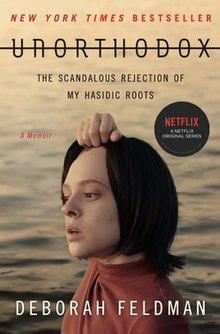Unorthodox: The Scandalous Rejection of My Hasidic Roots is a 2012 memoir by Deborah Feldman. In the book, she documents her life in an ultra-religious Jewish community in Brooklyn, New York. The Netflix miniseries Unorthodox is loosely based on the book.
 | |
| Author | Deborah Feldman |
|---|---|
| Publisher | Simon & Schuster |
Publication date | February 14, 2012 |
| Pages | 272 |
| ISBN | 978-1439187012 |
Overview
editFeldman was born into Satmar community in Brooklyn where the primary language is Yiddish. The community maintains a code of customs governing everything from what one wears, what is read, and to whom one generally speaks.
Feldman's move away from the community started with going to the library and hiding books written in English. At 17, she was married. Feldman said she did not have sex education, claimed she was trapped in a sexually and emotionally dysfunctional marriage, and the failure to produce a child dominated her life. After becoming pregnant, she realized she wanted something more for her child, and planned to leave the community.[1][2]
Reception
editPublishers Weekly called the book an "engaging and at times gripping insight into Brooklyn's Hasidic community".[1]
Lisa Bonos of The Washington Post wrote that "Feldman seems to render this secretive community authentically; I only wish she'd spent a bit more time editing herself. The lopsided book traverses her childhood in painstaking detail, which is often redundant and overwrought... I certainly understood that Feldman wanted more out of life; but in the end, I wanted more from her narration. How did she handle such a tough transition, raising a child while attending college at Sarah Lawrence? She spends so much time on the world she left—without much exploration of where she's ended up."[3]
The Jewish Book Council reviewed the book, saying: "In the Satmar world, what Feldman did was scandalous, but her story didn't provide the drama and intrigue it seemed to have promised. However, it does provide a window into a world not many of us know about or can fathom. Her story, slow at first, invites us into the homes and mindsets of the Satmar people, at times wholesome and warm, and at others lonely, shocking, and disturbing. Feldman is reflective, never mincing words, saying exactly how she feels about everything. For a woman with little formal secular education, her writing is eloquent and stirring."[4]
The New York Jewish Week reported that the book "spurred a cottage industry devoted to dispelling its inaccuracies".[5]
Miniseries
editThe 2020 Netflix original miniseries, Unorthodox, is loosely based on this book.[6] Netflix also produced a documentary, Making Unorthodox, that chronicles the creative process and filming, and discusses the differences between the book and the series.[7]
About the author
editAfter leaving the Hasidic community, Deborah Feldman started blogging, and in 2012, she published her autobiography, Unorthodox: The Scandalous Rejection of My Hasidic Roots. In 2014, she moved to Berlin, continued to work as a writer,[8] and published Exodus: A Memoir.[8][9] Both books have been translated into German, and were well received by critics, which led to her appearing on various talk shows on German TV.[10][11]
Feldman is featured in the 2018 Swiss-German documentary #Female Pleasure.[12]
References
edit- ^ a b "Publishers Weekly review: Unorthodox: The Scandalous Rejection of My Hasidic Roots". Publishers Weekly. Archived from the original on 13 April 2020. Retrieved 13 April 2020.
- ^ "Goodreads review: Unorthodox: The Scandalous Rejection of My Hasidic Roots". Goodreads.com. Goodreads. Archived from the original on 13 April 2020. Retrieved 13 April 2020.
- ^ Bonos, Lisa (7 April 2012). ""Unorthodox: The Scandalous Rejection of My Hasidic Roots" by Deborah Feldman". Washington Post. Archived from the original on 13 April 2020. Retrieved 13 April 2020.
- ^ Michelson, Libi Adler (27 April 2012). "Review: Unorthodox: The Scandalous Rejection of My Hasidic Roots". jewishbookcouncil.org. Jewish Book Council. Archived from the original on 13 April 2020. Retrieved 13 April 2020.
- ^ Wiener, Julie (6 March 2012). "'Unorthodox' With The Facts?". Times of Israel. Archived from the original on 15 April 2020. Retrieved 15 April 2020.
- ^ MazriaKatz, Marisa (26 March 2020). "In 'Unorthodox,' A Religious Woman Leaves Her Marriage And Her Past Behind". NPR. Retrieved 30 April 2020.
- ^ Nicolaou, Elena (26 March 2020). "Netflix's Unorthodox Is Inspired by the True Story of Deborah Feldman". oprahmag.com. The Oprah Magazine. Archived from the original on 13 April 2020. Retrieved 13 April 2020.
- ^ a b Arfa, Orit (3 May 2018). "From Williamsburg to Berlin". Jerusalem Post. Archived from the original on 12 April 2020. Retrieved 12 April 2020.
- ^ Feldman, Deborah (25 March 2014). Exodus: A Memoir. Blue Rider Press. p. 304. ISBN 978-0399162770.
- ^ Wiener, Julie (9 February 2012). "Unapologetically 'Unorthodox'". Times of Israel. Archived from the original on 12 April 2020. Retrieved 12 April 2020.
- ^ Feldman, Deborah (28 August 2010). "Once upon a life: Deborah Feldman". The Guardian. Archived from the original on 12 April 2020. Retrieved 12 April 2020.
- ^ "#Female Pleasure". wmm.com. Women Make Movies. Archived from the original on 12 April 2020. Retrieved 12 April 2020.